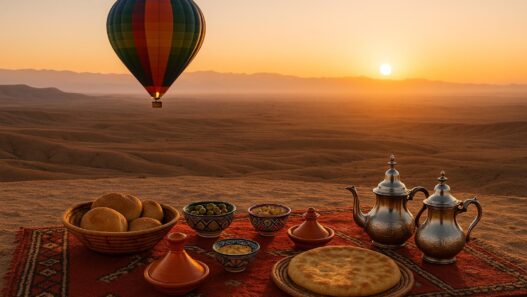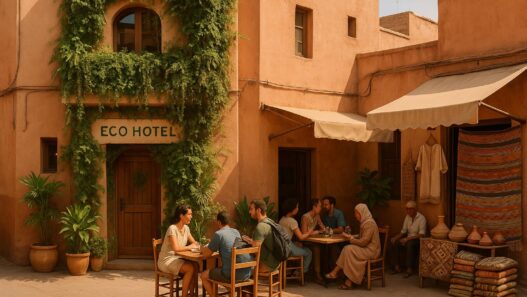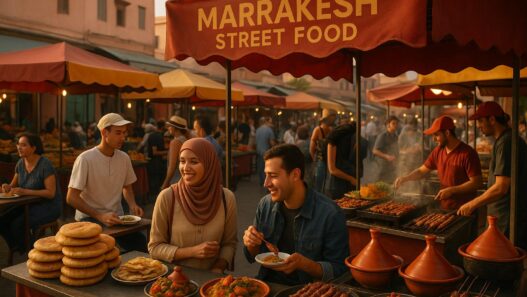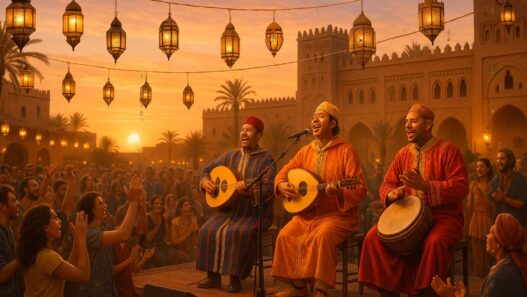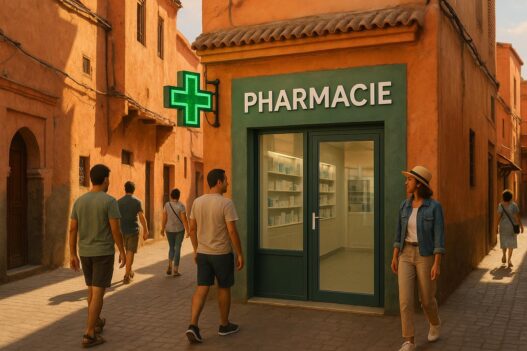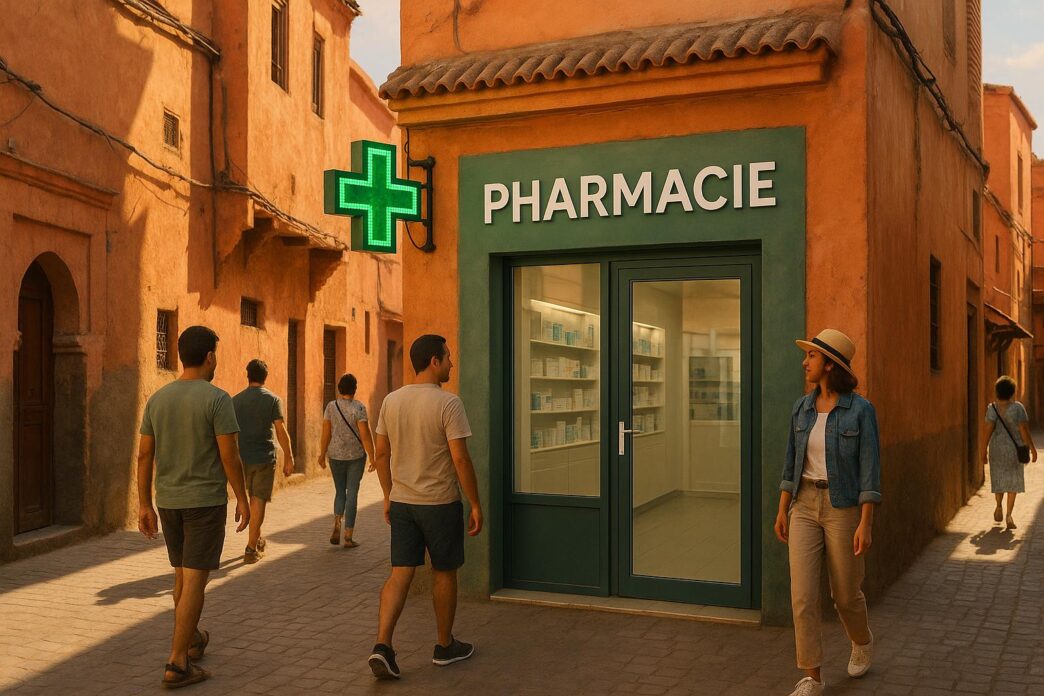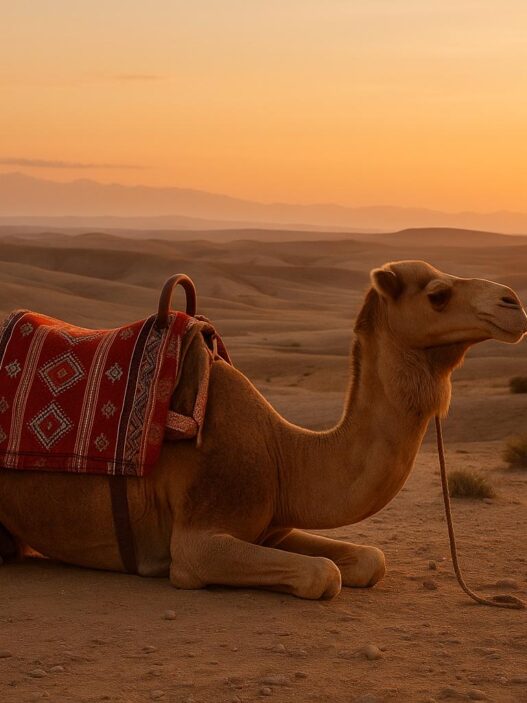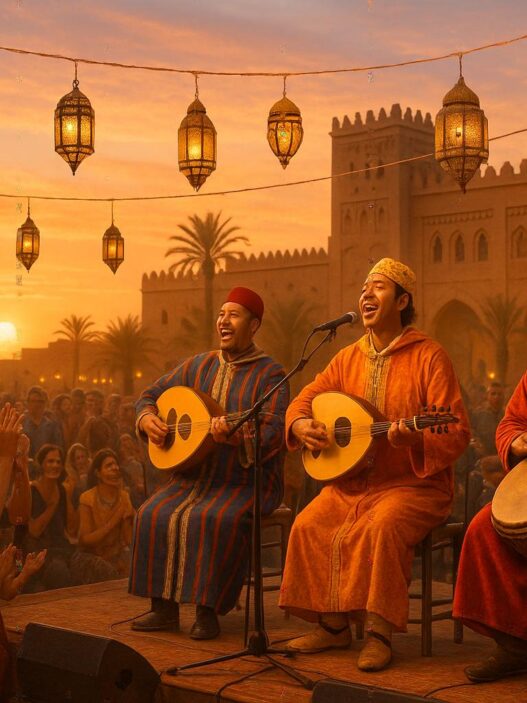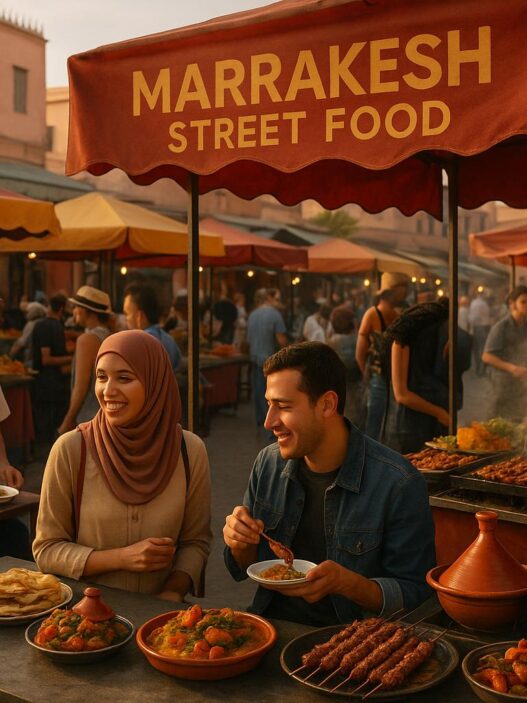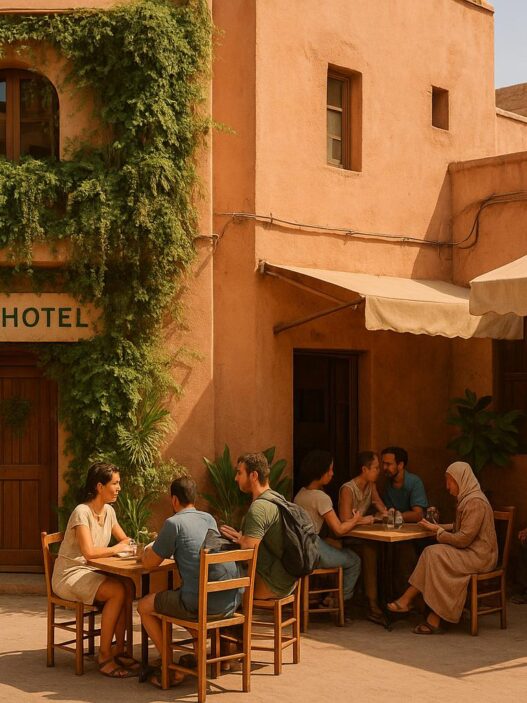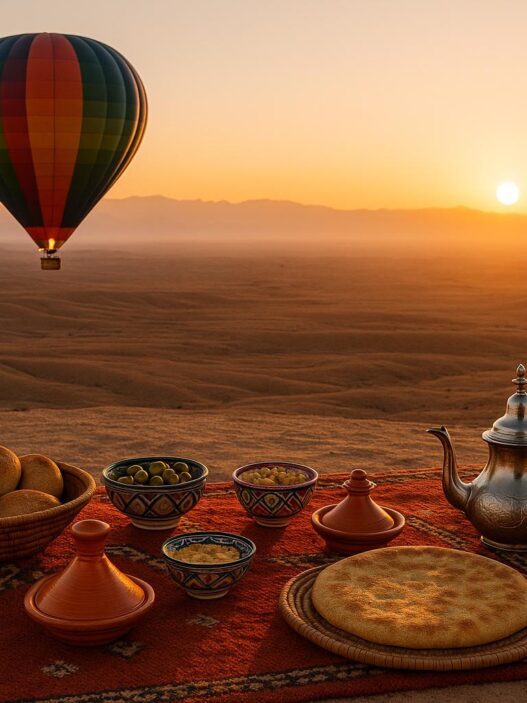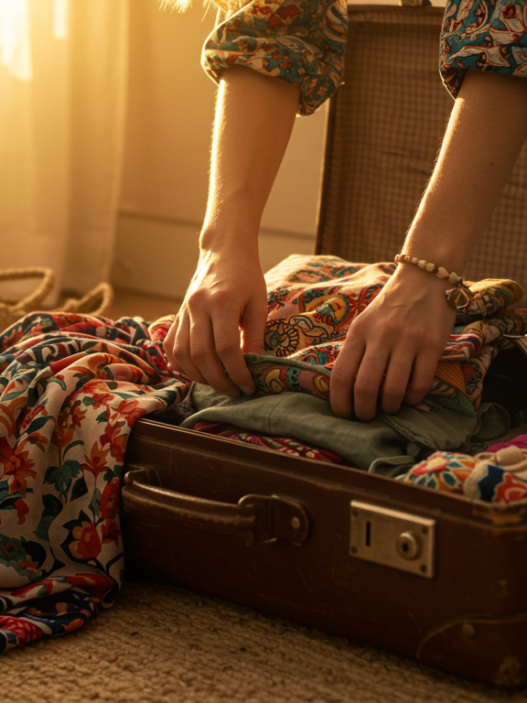If you’re visiting Marrakesh and need a pharmacy, here’s what you need to know:
- Key Areas: Pharmacies are easy to find along Avenue Mohammed V, in Gueliz, and near Jemaa el Fna square. Look for green neon crosses above the doors.
- 24/7 Options: For late-night emergencies, check the pharmacy near Jemaa el Fna by the police station or Pharmacie de Nuit on Rue Khalid ben Oualid.
- Languages: Most pharmacists speak French and Arabic. English is less common but more likely in tourist areas.
- Products: Pharmacies offer over-the-counter medications, basic healthcare services, and some prescription drugs without needing a prescription.
- Hours: Open Monday to Saturday from 8:30 AM–12:30 PM, 4:00 PM–8:00 PM, and 8:30 PM–1:00 AM.
- Payment: Cash (Moroccan Dirhams) is preferred. Credit cards may not be widely accepted.
Knowing these basics can save you time and stress during your trip.
Where to Find Pharmacies in Marrakesh
Main Pharmacy Areas
If you’re in Marrakesh and need a pharmacy, Avenue Mohammed V is a great place to start. This bustling avenue, particularly between Place Abdelmoumen Ben Ali and Place de la Liberté, is lined with pharmacies marked by green neon crosses, making them easy to spot. It’s a convenient area, especially for tourists.
The Gueliz district is another reliable spot. One well-known option here is Pharmacie Centrale, located at 166 Rue de la Liberté.
Travelers near Jemaa el Fna square are also in luck. Pharmacie de la Place is conveniently located at the start of Rue Prince Moulay Rachid, offering easy access for those exploring the medina. If you’re staying nearby, Palacio Pharmacy at 183 Rue Mohammed el Beqal is another solid choice.
For late-night needs, there’s an all-night pharmacy on the western edge of Jemaa el Fna, right next to the Commissariat de Police. Keep in mind, there might be a short wait. Another after-hours option is Pharmacie de Nuit, situated outside the medina on Rue Khalid ben Oualid, near Place de la Liberté.
Once you’re in these areas, knowing how to identify a pharmacy will make your search even easier.
How to Spot Pharmacies
Pharmacies in Marrakesh are easy to recognize. Look for the universal green neon cross above the door – this symbol is consistent throughout the city.
When asking for directions, it’s helpful to use the word "pharmacy" or the French term "pharmacie." Locals may not understand "chemist", so sticking with these terms ensures clearer communication.
Pharmacies often display useful information on their doors, like a list of after-hours locations, which can be a lifesaver if you need medication outside regular hours. Speaking of hours, most pharmacies operate from 8:30 AM to 12:30 PM, reopen from 4:00 PM to 8:00 PM, and then again from 8:30 PM to 1:00 AM, Monday through Saturday. Knowing these details makes it easier to find what you need when you need it.
How to Choose Safe and Trustworthy Pharmacies
What Good Pharmacies Look Like
Pharmacies in Marrakesh are generally professional and well-stocked, making them a reliable option for your medical needs. When assessing a pharmacy, start with the basics: look for clear signage, clearly posted business hours, and a clean, organized environment. Legitimate pharmacies will have licensed staff on hand and ensure medications are stored properly.
In Morocco, pharmacies operate under strict regulations set by the Ministry of Health, with oversight from national quality control bodies. If you need prescription medication, make sure to bring a valid doctor’s prescription, as legitimate pharmacies will require it before dispensing any medication. Keep all receipts and documentation, as these may be necessary for insurance reimbursement later.
Be mindful of counterfeit medications, especially in tourist-heavy areas. To avoid issues, ensure your prescription medications are in their original packaging and carry your doctor’s prescription with you. Before traveling, it’s a good idea to check with the Government of Morocco Ministry of Foreign Affairs to confirm that your medications are permitted in the country.
Finding Pharmacies After Hours and During Emergencies
While finding a reliable pharmacy during the day is straightforward, knowing where to go after hours or in an emergency is equally important. Many pharmacies that operate after hours will post updated information on their doors, making it easier to locate one that’s open. You can also ask your hotel concierge or local contacts for assistance. In urgent situations, a quick call to your hotel’s front desk can save time by confirming which nearby pharmacy is available.
Keep in mind that prices at emergency pharmacies may be higher than usual. Many pharmacy staff are accustomed to assisting travelers and often speak French, so having a translation app or knowing a few basic phrases can be helpful if you need to explain more complex issues.
Magical Marrakech | Best 4 Days Itinerary 🇲🇦
Dealing with Language Barriers at Pharmacies
Clear communication is essential when it comes to getting the right medication, especially if you’re navigating language barriers in a foreign country.
What Languages Pharmacy Staff Speak
In Marrakesh, most pharmacy staff are fluent in Arabic and French, with French being particularly prominent in the medical field. This makes French a dependable option for discussing medications and health concerns.
English, on the other hand, is less commonly spoken, though you might find some staff who know basic English in tourist-heavy areas like the Medina or Gueliz district. However, having detailed medical conversations in English could be a challenge. While English is becoming more popular in Morocco, especially with the rise of language centers at universities in cities like Marrakesh, it’s not yet a common language in healthcare settings.
Arabic, the official language, is widely spoken, but many locals use Moroccan Arabic (Darija), which differs from standard Arabic. In some cases, pharmacy staff may also speak Tamazight, particularly in areas serving Amazigh communities. To address language gaps, medical students have even developed guides in Tamazight to assist healthcare workers in communicating with non-Arabic speakers.
Given these language dynamics, having tools and strategies to bridge the gap can make all the difference.
How to Communicate When You Don’t Speak the Language
Translation apps are invaluable when dealing with language barriers. Apps like MoroTranslate, designed specifically for Moroccan Darija, can be particularly helpful.
Before heading to the pharmacy, prepare by writing down both the generic and brand names of the medication you need, as well as details about your condition. Including the active ingredient in English gives the pharmacist more ways to identify what you’re looking for.
Learning a few key phrases can also go a long way. Simple greetings like "As-salaam Alaykum" (hello) and "Shukran" (thank you) show politeness and effort. If you’re unsure about the language spoken, ask, "Hal tatakallam al-ingliziya?" (do you speak English?). Visual aids, like photos of symptoms or conditions, can also help clarify your needs.
For something like pain relief, pointing directly to the affected area while expressing discomfort can often get your message across.
If you’re still struggling to communicate, don’t hesitate to seek help from others. Many locals in tourist areas speak multiple languages and are often willing to assist. Additionally, hotel staff can be a great resource – they can write down your needs in French or Arabic before your pharmacy visit, ensuring you’re prepared.
sbb-itb-fa26f1f
What You’ll Find: Products, Services, and How Things Work
Pharmacies in Marrakesh go beyond the typical offerings of U.S. drugstores, providing a variety of products and services tailored to local needs.
Products and Services Available
Moroccan pharmacies carry an assortment of over-the-counter essentials, including pain relievers, cough medicines, and antihistamines. But they’re not just about selling medicines – they’re also a hub for healthcare advice. Pharmacists are trained to guide customers through minor health concerns like colds, coughs, and general aches. They’ll explain how to use medications properly, discuss potential side effects, and highlight any possible drug interactions.
Some pharmacies even provide extra services like free blood pressure checks, cholesterol testing, and access to emergency contraception. Blood sugar testing is also an option at some locations, though it’s a good idea to confirm availability beforehand.
For travelers, this level of service can be incredibly helpful. Pharmacists often recommend treatments for minor issues without requiring a doctor’s prescription, saving both time and money. They can act as a first stop for health concerns that don’t warrant a trip to the doctor.
Understanding how prescriptions and local practices work is essential for making the most of these services.
Prescription Rules and Local Practices
The prescription system in Morocco is less restrictive than what you might be used to in the U.S. While certain medications like antibiotics and stronger painkillers still require a prescription, many drugs that are prescription-only in the U.S. can be purchased directly from a pharmacy.
Both brand-name medications and more affordable generics are readily available. The generics, in particular, make healthcare costs more manageable. If you’re traveling with a prescription, it’s smart to carry the original packaging along with the prescription itself. In cases where your specific medication isn’t in stock, a local doctor can issue a prescription for an alternative.
For travelers, buying medications locally is often a practical option, especially for common health concerns. The wide availability of over-the-counter options adds to the convenience.
Pharmacy Hours
Pharmacies in Marrakesh typically operate from 8:30 AM to 12:30 PM, then reopen from 4:00 PM to 8:00 PM, and again from 8:30 PM to 1:00 AM, Monday through Saturday. Many also post information about after-hours services on their doors, making it easier to find assistance when needed.
Getting There: Transportation and Payment Methods
Getting around Marrakesh and handling cash wisely are crucial for accessing reliable pharmacies. The city offers various transportation options, and being prepared can save you both time and effort.
How to Get to Pharmacies
If you’re in the medina, walking is often the easiest and most efficient way to get around. The historic center is compact, pedestrian-friendly, and free of cars, making it ideal for exploring on foot. To avoid getting lost in the maze-like streets, consider downloading an offline map app like Maps.Me.
For short trips within the city, petit taxis are a convenient choice. These small cabs are perfect if you need to quickly reach a specific pharmacy or if you’re staying in the modern Gueliz district. Always insist that the driver uses the meter – if they refuse, simply find another taxi.
If you’re traveling with a group or heading outside the city, grand taxis are a better option. These larger shared vehicles depart from designated taxi terminals. Just head to the terminal and ask for a "place" (a seat) to your destination. While they’re not ideal for quick trips, they’re quite useful for journeys beyond the city center.
For a budget-friendly option, Alsa city buses are available at just 4 MAD per ticket (around $0.40). However, buses can get crowded, so be prepared. It’s also a good idea to carry small change since bus drivers may not have enough cash to provide change.
Once you’ve arrived at your destination, understanding how to pay is just as important.
How to Pay for Your Purchases
In Marrakesh, cash is king. The local currency is the Moroccan Dirham (MAD), and most transactions are cash-based. While credit cards are accepted at some higher-end establishments, they’re rarely an option at pharmacies or smaller shops. In fact, over 70% of point-of-sale transactions across Morocco are completed in cash.
You can exchange dollars for dirhams at the airport upon arrival or withdraw cash from ATMs around the city. Make sure to request small denominations, as they’re incredibly useful for tipping and smaller purchases.
Here’s a quick currency guide: one Euro equals roughly 11 Moroccan Dirhams, and £1 is about 13 Dirhams. Contactless credit cards are accepted, but only for payments up to 600 MAD (around $60). To avoid any issues, it’s best to carry enough cash when visiting pharmacies.
Understanding local customs can also help you navigate transactions more smoothly.
What American Tourists Should Know
For American travelers, being aware of local norms can make your experience much easier. Tipping is customary in Marrakesh – leaving two or three dirhams for small services, like a coffee or soft drink, is considered polite. However, avoid tipping with foreign coins, as they’re not useful to locals. At higher-end venues, check if a service charge is already included before adding an extra tip.
When visiting pharmacies, it’s helpful to know they’re simply referred to as "pharmacies" rather than "chemists." Many pharmacists speak French, so having a few basic French phrases or a translation app can go a long way in ensuring clear communication.
Summary: Main Points for Finding Pharmacies in Marrakesh
Finding pharmacies in Marrakesh is straightforward if you know what to look for. Keep an eye out for the universal green cross symbol, especially in prominent areas like Avenue Mohammed V. If you need a pharmacy after hours, check the sign on a closed pharmacy for details about the nearest open one. Two reliable 24-hour options include the pharmacy at Jemaa el Fna near the Commissariat de Police and the Pharmacie de Nuit on rue Khalid ben Oualid, where a doctor is often available.
Since many pharmacists in Marrakesh speak French, knowing a few basic phrases can make communication much easier. Alternatively, translation apps or visual aids, like pointing to the problem area or showing a medication package, can be very helpful.
FAQs
What should I know about safely buying medications from pharmacies in Marrakesh?
When buying medications in Marrakesh, it’s important to prioritize safety. Stick to licensed pharmacies and make sure a qualified pharmacist is present. Avoid purchasing medications from street vendors, as these might not meet proper safety standards. If you need prescription medication, bring along a valid prescription from your doctor. If you’re ever uncertain about a medication’s safety or authenticity, seek advice from a local healthcare professional.
What can I do if a pharmacy in Marrakesh doesn’t have the medication I need?
If you’re in Marrakesh and a pharmacy doesn’t have the medication you need, don’t hesitate to ask the pharmacist for guidance. They can often suggest an alternative or point you toward a larger or specialized pharmacy that might stock what you’re looking for. Having a copy of your prescription is incredibly helpful to ensure you receive the correct medication or an appropriate substitute.
For over-the-counter remedies, consider visiting herbal medicine shops in the bustling souks. Traditional remedies are a common part of Moroccan healthcare and might offer solutions for minor ailments. However, if your medication is essential, it’s wise to pack enough for your entire trip, as availability can be unpredictable. Also, double-check local regulations to make sure your medication complies with Moroccan customs laws.
How can I communicate with pharmacy staff in Marrakesh if I don’t speak Arabic or French?
If you don’t speak Arabic or French, don’t worry – there are still plenty of ways to communicate with pharmacy staff in Marrakesh. In many tourist-heavy areas, you’ll find pharmacies where the staff speaks English, so those are a good starting point.
Another handy tool? Translation apps on your smartphone. These can be incredibly useful for quick exchanges, like describing symptoms or requesting specific medications.
You can also bring along visual aids or jot down key phrases and simple drawings in a notebook to help explain what you need. A little patience and politeness can make a big difference, as pharmacy staff are generally experienced in assisting tourists who face language challenges.



